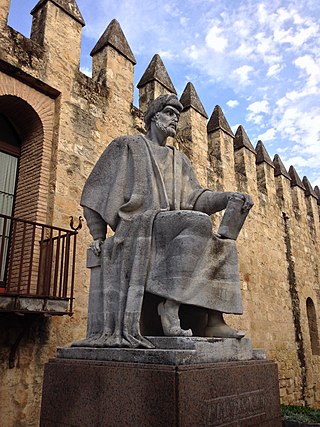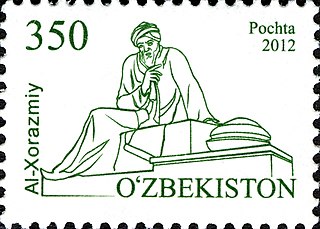Lists of Islamic scholars include:

Ibn Sina, commonly known in the West as Avicenna, was a preeminent philosopher and physician of the Muslim world, flourishing during the Islamic Golden Age, serving in the courts of various Iranian rulers. He is often described as the father of early modern medicine. His philosophy was of the Peripatetic school derived from Aristotelianism.

Ibn Rushd, often Latinized as Averroes, was an Andalusian polymath and jurist who wrote about many subjects, including philosophy, theology, medicine, astronomy, physics, psychology, mathematics, Islamic jurisprudence and law, and linguistics. The author of more than 100 books and treatises, his philosophical works include numerous commentaries on Aristotle, for which he was known in the Western world as The Commentator and Father of Rationalism.
This article contains links to lists of scientists.

Islamic philosophy is philosophy that emerges from the Islamic tradition. Two terms traditionally used in the Islamic world are sometimes translated as philosophy—falsafa, which refers to philosophy as well as logic, mathematics, and physics; and Kalam, which refers to a rationalist form of Scholastic Islamic theology which includes the schools of Maturidiyah, Ashaira and Mu'tazila.
Early Islamic philosophy or classical Islamic philosophy is a period of intense philosophical development beginning in the 2nd century AH of the Islamic calendar and lasting until the 6th century AH. The period is known as the Islamic Golden Age, and the achievements of this period had a crucial influence in the development of modern philosophy and science. For Renaissance Europe, "Muslim maritime, agricultural, and technological innovations, as well as much East Asian technology via the Muslim world, made their way to western Europe in one of the largest technology transfers in world history." This period starts with al-Kindi in the 9th century and ends with Averroes at the end of 12th century. The death of Averroes effectively marks the end of a particular discipline of Islamic philosophy usually called the Peripatetic Arabic School, and philosophical activity declined significantly in Western Islamic countries, namely in Islamic Spain and North Africa, though it persisted for much longer in the Eastern countries, in particular Persia and India where several schools of philosophy continued to flourish: Avicennism, Illuminationist philosophy, Mystical philosophy, and Transcendent theosophy.

Abu Nasr Muhammad al-Farabi, known in the Latin West as Alpharabius, was an early Islamic philosopher and music theorist. He has been designated as "Father of Islamic Neoplatonism", and the "Founder of Islamic Political Philosophy".
Islamic studies refers to the academic study of Islam, which is analogous to related fields such as Jewish studies and Quranic studies. Islamic studies seeks to understand the past and the potential future of the Islamic world. In this multidisciplinary program, scholars from diverse areas participate and exchange ideas pertaining to the particular field of study.

Abu Rayhan Muhammad ibn Ahmad al-Biruni, known as al-Biruni, was a Khwarazmian Iranian scholar and polymath during the Islamic Golden Age. He has been called variously "Father of Comparative Religion", "Father of modern geodesy", Founder of Indology and the first anthropologist.

Shihāb ad-Dīn Yahya ibn Habash Suhrawardī (1154–1191) was a Persian philosopher and founder of the Iranian school of Illuminationism, an important school in Islamic philosophy. The "light" in his "Philosophy of Illumination" is the source of knowledge. He is referred to by the honorific title Shaikh al-ʿIshraq "Master of Illumination" and Shaikh al-Maqtul "the Murdered Master", in reference to his execution for heresy. Mulla Sadra, the Persian sage of the Safavid era described Suhrawardi as the "Reviver of the Traces of the Pahlavi (Iranian) Sages", and Suhrawardi, in his magnum opus "The Philosophy of Illumination", thought of himself as a reviver or resuscitator of the ancient tradition of Persian wisdom. Suhrawardi provided a new Platonic critique of the peripatetic school of Avicenna that was dominant at his times, and that critique involved the fields of Logic, Physics, Epistemology, Psychology, and Metaphysics.
Contemporary Islamic philosophy revives some of the trends of medieval Islamic philosophy, notably the tension between Mutazilite and Asharite views of ethics in science and law, and the duty of Muslims and role of Islam in the sociology of knowledge and in forming ethical codes and legal codes, especially the fiqh and rules of jihad.
Lists of notable Muslims include:

Lists of Muslim scientists and scholars cover scientists and scholars who were active in the Islamic world before the modern era. They include:

Islamic psychology or ʿilm al-nafs, the science of the nafs, is the medical and philosophical study of the psyche from an Islamic perspective and addresses topics in psychology, neuroscience, philosophy of mind, and psychiatry as well as psychosomatic medicine. In Islam, mental health and mental illness were viewed with a holistic approach. This approach emphasized the mutual connection between maintaining adequate mental wellbeing and good physical health in an individual. People who practice Islam thought it was necessary to maintain positive mental health in order to partake in prayer and other religious obligations.
This is a timeline of philosophy in 16th century.
Muhammad Fazlur Rahman Ansari was a Pakistani Islamic scholar and philosopher.

Osman Bakar is the 7th Rector of International Islamic University Malaysia who has served since 23 September 2024. He is an emeritus professor of philosophy at the University of Malaya, the Chair Professor and Director of Sultan Omar Ali Saifuddien Centre for Islamic Studies (SOASCIS), Universiti Brunei Darussalam and an Islamic philosopher. He is a fellow at the Center for Civilisational Dialogue in the University of Malaya and Doshisha University in Japan and a former President of the Islamic Academy of Sciences of Malaysia. He was the recipient of the honorary title "Dato" by the Sultan of Pahang in 1994 and "Datuk" by the King of Malaysia in 2000, and was Included in the list of 500 most influential Muslims in the world several times.